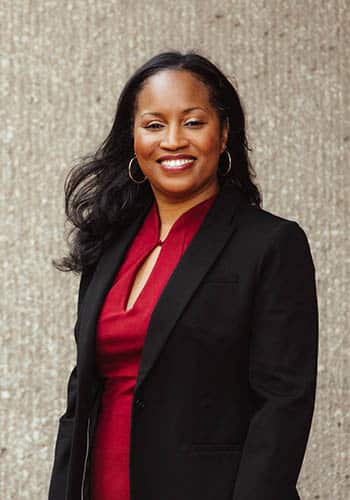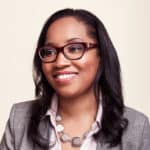Alumni Spotlight: Franita Tolson (’01)
Never Say Never
By keeping an open mind, Franita Tolson (’01) has put together a decorated career as a law professor and dean.

Truman was the first never. Coming out of high school in Chicago, Tolson had never heard of Truman. She had planned on attending an HBCU, but when a guidance counselor at an educational services company in the city pointed her in the direction of northeast Missouri and all the University had to offer, the decision was made – by her mother.
“I didn’t know where Truman was, she didn’t know where Truman was, but my mom was like, ‘you’re going to Truman,’” Tolson said.
A history degree was another never. Tolson loved the subject, but was uncertain what career options would be available since she did not want to teach. Her first year on campus she studied business. By the second year, she changed her mind and took a leap of faith.
“I couldn’t figure out the job prospects with a history degree, but I just went for it,” Tolson said. “I knew I would enjoy taking the classes, so I figured I should just do that.”
Tolson had not planned on going to law school, but after exploring post-graduate options she chose that route. She ended up returning home and attending the University of Chicago Law School – where some guy named Obama was one of her constitutional law professors – with future plans of joining a firm in the city. By her second year, Tolson could feel the pull of something she never imagined – teaching.
“Law is a service industry. Law schools graduate people who are going to help individuals at the lowest points of their lives in many cases,” she said. “It’s really important to graduate people who are not only smart, but people who feel a moral and ethical obligation to their communities because people trust them at the most vulnerable times in their lives. How we train students to think about these problems, and also impart on them the obligation to feel like they have to deliver the best possible service to these individuals, teaching just felt very consequential. It really is a privilege to be able to do this.”
Following clerkships with the U.S. District Court for the Northern District of Illinois and the U.S. Court of Appeals for the Seventh Circuit, Tolson began her academic career as a visiting assistant professor at Northwestern University School of Law. A year later, this Chicago girl left her hometown for a position with the Florida State University College of Law where she became the Betty T. Ferguson Professor of Voting Rights and was awarded tenure. By 2016, Tolson was at USC and was soon asked to serve as the vice dean for faculty and academic affairs for its Gould School of Law. Since July 2023, she has led the school in an interim dean capacity, a role she may want to pursue on a more permanent basis.
“It’s a platform where you can really influence change, shift the direction that the law is going,” Tolson said. “Innovation, growth, figuring out ways to streamline our program, ways to bring in more faculty who do more things that reflect where the law is now – issues like that excite me.”
For Tolson, election law is the area that piques her interests the most. She came to it in the wake of the 2008 presidential election after seeing an increase in court cases involving voting rights. Tolson’s work looks at the historical underpinnings of election law, and she became an expert on the subject, particularly in Section Two of the 14th Amendment. While most people may be familiar with equal protection and the due process aspects of Section One, the amendment has five sections. Section Two deals with Congress’ ability to reduce a state’s delegation in the House of Representatives if a state abridges or denies the right to vote.
“Section Two was meant to be a good thing, but the way it has been used by the Supreme Court is actually pretty bad,” she said. “In the end, I was just really curious about how Congress, rather than the courts, has intervened in our system of elections. I spent a lot of time doing research on that, and that’s what led to the book.”
Tolson’s book, “In Congress We Trust?: Congressional Power Over Voting from the Founding to the Jim Crow Era,” is slated to be released in 2024, probably around the time of the next election. However, do not mistake it for yet another ‘hot take’ political opinion book looking for a quick cash grab. It just so happens that since she began researching election law it has become a prominent issue in media and political circles.

For Tolson, election law is not a matter of partisan politics. Her interest in the subject comes down to a matter of rules and fairness.
“Regardless of how you feel about the candidates, these are procedural questions that should concern everyone,” she said. “We have to be careful about prioritizing outcome over process. Even if the outcome favors the candidate I like, I wouldn’t want to live in that world where my preferred candidate wins through a flawed and unrepresentative process.”
By their very nature, elections involve a certain element of division, and contemporary politics has exacerbated that in the eyes of many Americans. While her upcoming book could be seen as a cautionary tale for some, Tolson chooses to take a more optimistic view.
“It is a hopeful book, because it shows that we can fix this,” she said. “To the extent that there are still people who are elected to government who care about American democracy, who care about fairness in elections, there is a path forward, so it is a hopeful book.”